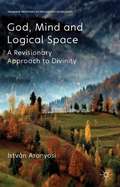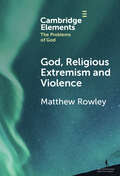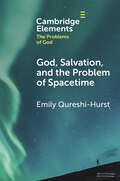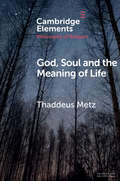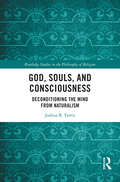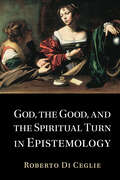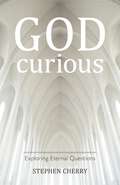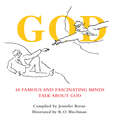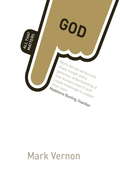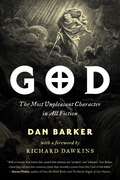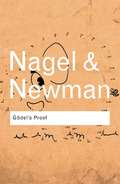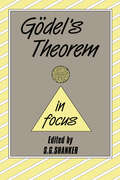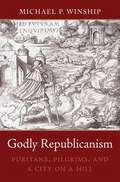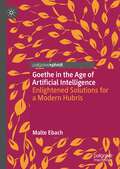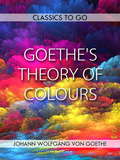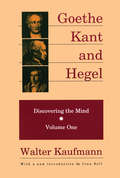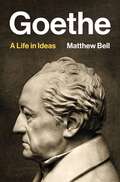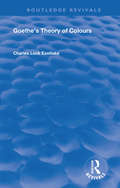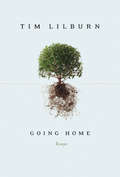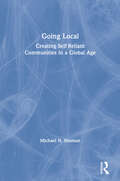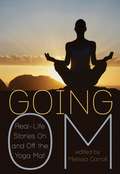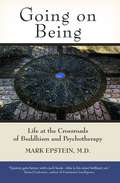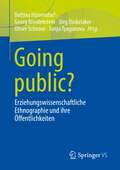- Table View
- List View
God, Mind, and Logical Space: A Revisionary Approach to Divinity (Palgrave Frontiers in Philosophy of Religion)
by István AranyosiThe book offers a novel approach to the idea of divinity in guise of a philosophical doctrine called 'Logical Pantheism', according to which the only way to establish the existence of God undeniably is by equating God with Logical Space.
God, Religious Extremism and Violence (Elements in the Problems of God)
by Matthew RowleyWhy do religious militants think their actions are right or righteous? What keeps me from acting like them? Why do some religious persons act on their beliefs in charitable, inspiring and deeply humane ways? Is secularism the solution to religious violence, or is it part of the problem? This Element explores the vexed issue of violence done in the name of God, looking at the topic through the lens of peace and conflict studies, religious studies and historical studies. The beliefs of various communities, religious and secular, are explored, looking at how convictions inhibit and enable violence. This Element aims to foster a deeper and more nuanced understanding of the promises and perils of religion so that readers can better respond to a world filled with violence.
God, Salvation, and the Problem of Spacetime (Elements in the Problems of God)
by Emily Qureshi-HurstMuch has been written on the relationship between the nature of temporal reality and the God of Classical Theism. Despite the popularity of this general area, what the physics and metaphysics of spacetime might mean for specific theological doctrines has received less attention. Recently, however, interest in this rich and dynamic interplay of ideas has seen rapid growth. This Element provides both an introduction to the physics and metaphysics of spacetime and a jumping-off point for understanding how these can – and in fact should – inform both Christian theology and the philosophy of religion more generally. The author will argue that the nature of spacetime raises particular and pressing problems for Christianity, specifically the interrelated doctrines of salvation and eschatology, and explore whether adequate solutions to these problems are available.
God, Soul and the Meaning of Life (Elements in the Philosophy of Religion)
by Thaddeus MetzThis Element critically explores the potential relevance of God or a soul for life's meaning as discussed in recent Anglo-American philosophical literature. There have been four broad views: God or a soul is necessary for meaning in our lives; neither is necessary for it; one or both would greatly enhance the meaning in our lives; one or both would substantially detract from it. This Element familiarizes readers with all four positions, paying particular attention to the latter two, and also presents prima facie objections to them, points out gaps in research agendas and suggests argumentative strategies that merit development.
God, Souls, and Consciousness: Deconditioning the Mind from Naturalism (Routledge Studies in the Philosophy of Religion)
by Joshua R. FarrisThis book provides a critique of naturalistic views of subjects and agency, arguing that these are conditioned ways of conceiving of the mind and the cosmos. It draws on the relevant literature on substance dualism, idealism, and theism to draw out the implications for a theistic view of the world.In contemporary analytic philosophy of mind, naturalism is the default position for thinking about the mind in relation to the world. This book argues that we should reconsider naturalistic paradigms in favor of a more holistic and bigger picture of the mind. It defends a form of theistic dualism in light of varying naturalistic trends that, arguably, place limiting pressures on our constructive views of humans as ensouled beings. The book takes seriously the notion of first-person phenomenological perspectives as the starting point for constructing a metaphysical view of the world. The author’s arguments touch on the topics of consciousness, dualism, cosmic purpose, science and religion, and the meaning of life. He proceeds to explore the implications of deconditioning on the philosophy of mind, theism, science, and the social sciences.God, Souls, and Consciousness will appeal to scholars and graduate students working in the philosophy of mind, philosophy of religion, religion and science, and analytic theology.
God, the Good, and Utilitarianism
by John PerryIs ethics about happiness? Aristotle thought so and for centuries Christians agreed, until utilitarianism raised worries about where this would lead. In this volume, Peter Singer, leading utilitarian philosopher and controversial defender of infanticide and euthanasia, addresses this question in conversation with Christian ethicists and secular utilitarians. Their engagement reveals surprising points of agreement and difference on questions of moral theory, the history of ethics, and current issues such as climate change, abortion, poverty and animal rights. The volume explores the advantages and pitfalls of basing morality on happiness; if ethics is teleological, is its proper aim the subjective satisfaction of preferences? Or is human flourishing found in objective goods: friendship, intellectual curiosity, meaningful labour? This volume provides a timely review of how utilitarians and Christians conceive of the good, and will be of great interest to those studying religious ethics, philosophy of religion and applied ethics.
God, the Good, and the Spiritual Turn in Epistemology
by Roberto Di CeglieIn this book, Roberto Di Ceglie offers an historical, theological, and epistemological investigation exploring how commitments to God and/or the good generate the optimum condition to achieve knowledge. Di Ceglie criticizes the common belief that to attain knowledge, one must always be ready to replace one's convictions with beliefs that appear to be proven. He defends a more comprehensive view, historically exemplified by outstanding Christian thinkers, whereby believers are expected to commit themselves to God and to related beliefs no matter how convincing the evidence contradicting such beliefs appears to be. He also argues that both believers and unbelievers can commit themselves to God and the good, respectively, thereby creating a spiritual turn in epistemology that enables them to generate the best possible condition for conducting rational enquiries and discussion.
God-Curious: Exploring Eternal Questions
by Stephen CherryIn a world where religion refuses to expire, two responses predominate. The first, to retrench within the certainties of one's native or adopted faith, questioning nothing; the second, to sneer and snarl from the secular side-lines. Here, Stephen Cherry offers a third alternative for religious believer, agnostic, and atheist alike - to engage with the study of theology. Confessing himself to be a reluctant theologian, Cherry puts forward three positive reasons why more people should take theology seriously - because it's fascinating, fun and important. He suggests that genuine theology is the antidote to fundamentalism, contrasts the theological approaches of Jesus of Nazareth and Richard Dawkins, introduces some of the biggest puzzles unravelled by theology, and reviews the history of the subject in fewer than 20 tweets. Drawing people at all stages of life into a more serious engagement with the riches, delights and fun of theology, it is a book for any who find themselves to be a little God-curious.
God: 48 Famous and Fascinating Minds Talk About God
by R. O. Blechman Jennifer BerneFor anyone who has wondered, "What have the greatest minds in human history thought of God?" This charmingly-illustrated compendium of quotes will inspire, comfort, and delight anyone who has contemplated the higher power. Throughout history, humans have been fascinated by the idea a divine, omnipotent being. This curiosity has captivated all of us, including civilization's most brilliant thinkers. God is a compilation of 48 carefully-chosen quotes from history's most interesting minds-including Homer, Galileo, Einstein, Pope Francis, and Maya Angelou-specifically on what they had to say when they pondered the higher power. The quotes are paired with delightful illustrations from famed New Yorker cartoonist R.O. Blechman, grounding this varied group of perspectives in a common visual language that is sure to amuse and delight readers.
God: All That Matters
by Mark VernonIn this book:'Mark Vernon writes with sharp insight and a generous understanding of how humans search and create meanings to sustain their lives' - Madeleine Bunting, Guardian.Why doesn't God go away? God: All That Matters, by philosopher Mark Vernon,suggests that there is something odd about the way God is discussed today. It is often as if the divine were being examined in a test tube, in a search for empirical and objective confirmation of his/her existence. Yet, for people of faith, the experience of God is nothing if not subjectively real; they know God, in-so-far as they do, in their lives. Vernon therefore looks to move the argument on from the debates between atheist and religious fundamentalists, to look at how people through time have looked for, experienced, and explained God - in suffering, in nature, in morality, in peak experiences, in goodness, in the future and in love.This accessible and concise book will appeal to both students and general readers, giving a fascinating introduction to a wide range of perspectives on God.The All That Matters series:All That Matters books:All books in the All That Matters series are written by world experts in their subject field. These experts work to distil a topic and get right to its heart, making the book accessible for both students and general readers. Each compelling book contains new and interesting perspectives and tells stories that matter.The Author:Mark Vernon has an unparalleled ability to convey profound philosophical ideas in a manner that is both accessible and personal but also rigorous and challenging.'- Raymond TallisMark Vernon is a journalist, broadcaster, teacher and author of several books. He is an honorary research fellow at Birkbeck, University of London and has degrees in physics, and theology and a PhD in philosophy. He was a priest in the Church of England, left a convinced atheist, though now takes religious and spiritualpractice very seriously - a journey he has written about in his book How to be an Agnostic.Keep up with Mark Vernon on his website: www.markvernon.com.Other books in the All That Matters series:All That Matters - Interesting introductions to important issuesBooks on the following subjects are available from the All That Matters series: Muhammad, Water, Political Philosophy, Sustainability, Philosophy, Intelligence, Love, Russian Revolution, War, and Creativity.To find out more visit: www.allthatmattersbooks.comGod - philosophy - the way God is discussed today - divine - empirical - objective - existence of God - faith - experience of God - subjective - debate - atheist - religious fundamentalists - explaining God - suffering - nature - morality - goodness - love - accessible - concise - students - general readers - fascinating - introduction - perspectives on God - spiritual practice - agnostic - All That Matters - pocket book - Christianity - Judaism - Islam - Buddhism - Sikhism - non-religious - spirituality
God: All That Matters (All That Matters)
by Mark VernonIn this book:'Mark Vernon writes with sharp insight and a generous understanding of how humans search and create meanings to sustain their lives' - Madeleine Bunting, Guardian.Why doesn't God go away? God: All That Matters, by philosopher Mark Vernon,suggests that there is something odd about the way God is discussed today. It is often as if the divine were being examined in a test tube, in a search for empirical and objective confirmation of his/her existence. Yet, for people of faith, the experience of God is nothing if not subjectively real; they know God, in-so-far as they do, in their lives. Vernon therefore looks to move the argument on from the debates between atheist and religious fundamentalists, to look at how people through time have looked for, experienced, and explained God - in suffering, in nature, in morality, in peak experiences, in goodness, in the future and in love.This accessible and concise book will appeal to both students and general readers, giving a fascinating introduction to a wide range of perspectives on God.The All That Matters series:All That Matters books:All books in the All That Matters series are written by world experts in their subject field. These experts work to distil a topic and get right to its heart, making the book accessible for both students and general readers. Each compelling book contains new and interesting perspectives and tells stories that matter.The Author:Mark Vernon has an unparalleled ability to convey profound philosophical ideas in a manner that is both accessible and personal but also rigorous and challenging.'- Raymond TallisMark Vernon is a journalist, broadcaster, teacher and author of several books. He is an honorary research fellow at Birkbeck, University of London and has degrees in physics, and theology and a PhD in philosophy. He was a priest in the Church of England, left a convinced atheist, though now takes religious and spiritualpractice very seriously - a journey he has written about in his book How to be an Agnostic.Keep up with Mark Vernon on his website: www.markvernon.com.Other books in the All That Matters series:All That Matters - Interesting introductions to important issuesBooks on the following subjects are available from the All That Matters series: Muhammad, Water, Political Philosophy, Sustainability, Philosophy, Intelligence, Love, Russian Revolution, War, and Creativity.To find out more visit: www.allthatmattersbooks.comGod - philosophy - the way God is discussed today - divine - empirical - objective - existence of God - faith - experience of God - subjective - debate - atheist - religious fundamentalists - explaining God - suffering - nature - morality - goodness - love - accessible - concise - students - general readers - fascinating - introduction - perspectives on God - spiritual practice - agnostic - All That Matters - pocket book - Christianity - Judaism - Islam - Buddhism - Sikhism - non-religious - spirituality
God: The Most Unpleasant Character in All Fiction
by Dan BarkerWhat words come to mind when we think of God? Merciful? Just? Compassionate? In fact, the Bible lays out God&’s primary qualities clearly: jealous, petty, unforgiving, bloodthirsty, vindictive—and worse! Originally conceived as a joint presentation between influential thinker and bestselling author Richard Dawkins and former evangelical preacher Dan Barker, this unique book provides an investigation into what may be the most unpleasant character in all fiction. Barker combs through both the Old and New Testament (as well as 13 different editions of the &“Good Book&”), presenting powerful evidence for why the Scripture shouldn&’t govern our everyday lives. This witty, well-researched book suggests that we should move past the Bible and clear a path to a kinder and more thoughtful world.
Godel's Proof
by Ernest Nagel James R. Newman'Nagel and Newman accomplish the wondrous task of clarifying the argumentative outline of Kurt Godel's celebrated logic bomb.' – The Guardian In 1931 the mathematical logician Kurt Godel published a revolutionary paper that challenged certain basic assumptions underpinning mathematics and logic. A colleague of physicist Albert Einstein, his theorem proved that mathematics was partly based on propositions not provable within the mathematical system. The importance of Godel's Proof rests upon its radical implications and has echoed throughout many fields, from maths to science to philosophy, computer design, artificial intelligence, even religion and psychology. While others such as Douglas Hofstadter and Roger Penrose have published bestsellers based on Godel’s theorem, this is the first book to present a readable explanation to both scholars and non-specialists alike. A gripping combination of science and accessibility, Godel’s Proof by Nagel and Newman is for both mathematicians and the idly curious, offering those with a taste for logic and philosophy the chance to satisfy their intellectual curiosity. Kurt Godel (1906 – 1978) Born in Brunn, he was a colleague of physicist Albert Einstein and professor at the Institute for Advanced Study in Princeton, N.J.
Godel's Theorem in Focus (Philosophers in Focus)
by S. G. ShankerA layman's guide to the mechanics of Gödel's proof together with a lucid discussion of the issues which it raises. Includes an essay discussing the significance of Gödel's work in the light of Wittgenstein's criticisms.
Godly Republicanism
by Michael P. WinshipPuritans did not find a life free from tyranny in the New World-they created it there. Massachusetts emerged a republic as they hammered out a vision of popular participation and limited government in church and state, spurred by Plymouth Pilgrims. "Godly Republicanism" underscores how pathbreaking yet rooted in puritanisms history the project was. Michael Winship takes us first to England, where he uncovers the roots of the puritans republican ideals in the aspirations and struggles of Elizabethan Presbyterians. Faced with the twin tyrannies of Catholicism and the crown, Presbyterians turned to the ancient New Testament churches for guidance. What they discovered there-whether it existed or not-was a republican structure that suggested better models for governing than monarchy. The puritans took their ideals to Massachusetts, but they did not forge their godly republic alone. In this book, for the first time, the separatists contentious, creative interaction with the puritans is given its due. Winship looks at the emergence of separatism and puritanism from shared origins in Elizabethan England, considers their split, and narrates the story of their reunion in Massachusetts. Out of the encounter between the separatist Plymouth Pilgrims and the puritans of Massachusetts Bay arose Massachusetts Congregationalism.
Goethe in the Age of Artificial Intelligence: Enlightened Solutions for a Modern Hubris
by Malte EbachInside you lies a precise scientific instrument – the ability to observe Nature and recall past experiences. You were born with it and you use it every day. You can be trained to use it more effectively to, for example, compare and discover new species of organisms or new minerals. Our senses do have limitations, and we often use microscopes, telescopes and other tools to aid our observation. However, we benefit from knowing their limitations and the impact they have on our ability to combine our observations and our experience to make decisions. Once these tools replace our direct observation and our experience we ourselves become disconnected from Nature. Scientific practice turns into well-meant opinions out-weighing empirical evidence. This is happening now in the current age of big data and artificial intelligence. The author calls this the Modern Hubris and it is slowly corroding science. To combat the Modern Hubris and to reconnect with Nature, scientists need to change the way they practise observation. To do so may require the scientist to transform themself. One person who successfully did this was Johann Wolfgang von Goethe. His journey demonstrates how one man attempted to take on the Modern Hubris by transforming his life and how he saw Nature. Following Goethe’s transformation teaches us how we can also reconnect ourselves with Nature and Natural science.
Goethe's Theory of Colours: Translated From The German, With Notes (Classics To Go)
by Johann Wolfgang von GoetheBy the time Goethe's "Theory of Colours" appeared in 1810, the wavelength theory of light and colour had been firmly established. To Goethe, the theory was the result of mistaking an incidental result for an elemental principle. Far from pretending to a knowledge of physics, he insisted that such knowledge was an actual hindrance to understanding. He based his conclusions exclusively upon exhaustive personal observation of the phenomena of colour. Of his own theory, Goethe was supremely confident: "From the philosopher, we believe we merit thanks for having traced the phenomena of colours to their first sources, to the circumstances under which they appear and are, and beyond which no further explanation respecting them is possible." Goethe's scientific conclusions have, of course, long since been thoroughly demolished, but the intelligent reader of today may enjoy this work on quite different grounds: for the beauty and sweep of his conjectures regarding the connection between colour and philosophical ideas; for an insight into early nineteenth-century beliefs and modes of thought; and for the flavour of life in Europe just after the American and French Revolutions. (Goodreads)
Goethe, Kant, and Hegel: Discovering the Mind (Discovering The Mind Ser.)
by Walter KaufmannThis immensely readable and absorbing book - the first of a three-volume series on understanding the human mind - concentrates on three major figures who have changed our image of human beings. Kaufmann drastically revises traditional conceptions of Goethe, Kant, and Hegel, showing how their ideas about the mind were shaped by their own distinctive mentalities.Kaufmann's version of psychohistory stays clear of gossip and is carefully documented. He offers us a radically new understanding of two centuries of intellectual history, but his primary focus is on self-knowledge. He is in a unique position to perform this task by virtue of being, according to Stephen Spender, "the best translator of Faust"; and in Sidney Hook's view, "unquestionably the most interesting and informative writer of Hegel in English."The foremost interpreter of Kant, Lewis White Beck, has called this book on Goethe, Kant, and.Hegel "fascinating" - a work which "will stir up a good many people by telling them things they have never heard, and providing an alternative to what is the accepted reading of that part of the history of philosophy. The story of how personality affects philosophy has never been better told." We are shown how Goethe advanced the discovery of the mind more than anyone before him, while Kant was in many ways a disaster. Hegel, like others between 1790 to 1990, tried to reconcile Kant and Goethe.Kaufmann shows this is impossible He paints a large picture, but he is always highly specific and details the major contributions of Goethe and Hegel as well as the ways in which Kant's immense influence proved catastrophic.
Goethe: A Life in Ideas
by Matthew BellA new intellectual biography of Goethe, examining the paradox of his thoughtJohann Wolfgang von Goethe (1749–1832) was a poet, a novelist, a scientist and an essayist on a dizzying range of topics. In the nineteenth century, he was widely regarded as one of the most important thinkers of modern Europe. In this important and ambitious work, Matthew Bell offers a wide-ranging intellectual biography of Goethe, tracing the evolution of his thought and reassessing its value. Bell examines the full spectrum of Goethe&’s writing, from his most well-known works, including the dramatic poem Faust and the novels Wilhelm Meister and The Sorrows of Young Werther, to lesser-known essays and reviews. Throughout, Bell draws on Goethe&’s letters and diaries, most of which are stll only available in German, embedding Goethe&’s thought in his lived experience and in the cultural and intellectual life of Europe from the 1750s to the 1830s.Bell presents new interpretations of Goethe&’s work as one of the first evolutionary biologists, describing discoveries that anticipated Darwin&’s, and of his political ideas, which pervade his literary work in ways that have not been fully recognized. Bell offers an original and illuminating explanation for the paradox of Goethe&’s thought, exploring how a radical individualist who espoused liberal and innovative ideas in some areas—in particular, religion, sexuality and science—could remain consistently conservative and authoritarian in his political outlook. Rereading Goethe through this new lens, Bell shows, reveals new dimensions of work we thought we knew well.
Goethe’s Theory of Colours: Translated From The German, With Notes (Routledge Revivals)
by Johann Wolfgang GoetheFirst published in German in 1810, this detailed volume was translated from the German by Charles Lock Eastlake and, in six parts, examines every aspect of Goethe’s theory of colours, including psychological colours, chemical colours, the moral effect of colour, minerals, plants, insects, mammals and a multitude of further subjects.
Going Home: Essays
by Tim LilburnLike his contemporaries Robert Bringhurst, Ronald Wright, Dennis Lee, Don McKay, and Jan Zwicky, Tim Lilburn has long been a deep thinker on issues of ecology and writing, and on how the two fit together philosophically, morally, and ethically. In Going Home, Lilburn addresses how we relate (often uneasily) to our physical landscape in Canada and the United States.Retrieving an almost lost strand in the Western intellectual tradition -- the erotic, contemplative strand, from Plato to John Cassian to the Areopagite -- Lilburn traces a history of eros and desire in the hope that this exercise and its awakening can lead us home to a full residence in North America. Surprising and enlightening, the collection finishes with two unforgettable personal essays, where Lilburn writes about his effort to enact desire in the place where his ancestors are buried, the flatlands and coulees of southern Saskatchewan.
Going Local: Creating Self-Reliant Communities in a Global Age
by Michael ShumanNational drug chains squeeze local pharmacies out of business, while corporate downsizing ships jobs overseas. All across America, communities large and small are losing control of their economies to outside interests. Going Local shows how some cities and towns are fighting back. Refusing to be overcome by Wal-Marts and layoffs, they are taking over abandoned factories, switching to local produce and manufactured goods, and pushing banks to loan money to local citizens. Shuman details how dozens of communities are recapturing their own economies with these new strategies, investing not in outsiders but in locally owned businesses.
Going Om
by Cheryl Strayed Melissa CarrollWith candid, witty, and compelling experiences of yoga from renowned memoirists, including Cheryl Strayed (author of the number-one New York Times bestseller Wild), Claire Dederer (author of national bestseller Poser: My Life in 23 Yoga Poses), Dinty W. Moore (author of The Accidental Buddhist), Neal Pollack (author of Stretch: The Making of a Yoga Dude) and many others, Going Om shares a range of observations about this popular practice. Unlike books on yoga that provide instruction on technique, Going Om is a unique collection of personal narratives from celebrated authors. This anthology of original material values the quality of writing over the authors' flexibility. Ira Sukrungruang shares his heartbreaking struggle as a 375 pound yoga student discovering self-worth on his mat; Gloria Munoz explores the practice of stillness with lyrical elegance in the midst of her busy mind; Neal Pollack's signature sarcasm leads to surprising turns at yoga class with his dad; Elizabeth Kadetsky uses yogic wisdom while coping with her mother's devastating Alzheimer's.
Going on Being
by Mark EpsteinBefore he began training as a psychiatrist, Mark Epstein immersed himself in Buddhism through influential teachers such as Ram Dass, Joseph Goldstein, and Jack Kornfield. Buddhism's positive outlook and the meditative principle of living in the moment profoundly influenced his study and practice of psychotherapy. Going on Being is an intimate chronicle of Epstein's formative years as well as a practical guide to how a Buddhist understanding of psychological problems can help anyone change for the better. Epstein gives readers a deeply personal look into his life, thoughts, fears, and hopes, while detailing the influences that have shaped his worldview. Inspiring in its honesty and humility, Going on Being is a compassionate, brilliant look at how uniting the worlds of psyche and spirit can lead to a new way of seeing reality.
Going public?: Erziehungswissenschaftliche Ethnographie und ihre Öffentlichkeiten
by Georg Breidenstein Tanya Tyagunova Jörg Dinkelaker Bettina Hünersdorf Oliver SchnoorDer Band dokumentiert die facettenreiche Diskussion des Verhältnisses von erziehungswissenschaftlicher Ethnographie zu ihren Öffentlichkeiten in gegenstandstheoretischer, methodologischer und politischer Hinsicht. Die Beiträge befassen sich mit der Frage, ob und warum sich erziehungswissenschaftliche Ethnographie welche Öffentlichkeiten erschließt bzw. erschließen sollte und welche Effekte jeweils davon für diese bzw. für (sozial-)pädagogische Handlungsfelder und ihre Adressat*innen ausgehen.
